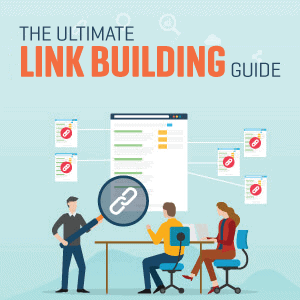 When it comes to SEO, link building is an advanced strategy that requires a lot of effort, persistence, and patience. Link building is one of the best ways to boost your site's organic traffic and ranking on the SERPs.
When it comes to SEO, link building is an advanced strategy that requires a lot of effort, persistence, and patience. Link building is one of the best ways to boost your site's organic traffic and ranking on the SERPs.
However, an effective link-building campaign is a combination of several things, including sales, marketing, strong social skills, and exceptional communication. Thus, if you want to learn more about how to create backlinks via different link-building strategies, then read this comprehensive guide.

Free Download: Link Building Guide (Infographic)

Want to share this on your site? Just copy the code below!
1. What is Link Building?

In simple terms, Link building refers to the process of acquiring links from relevant websites to your own website. It has been around for a long time, but have gained immense popularity in recent times as a white hat SEO technique that is used by marketers to increase website traffic through search.
The simple formula behind the link building process is that the more links you get (acquire) from relevant and authoritative websites, the better your site will perform in SERPs for relevant search queries. Link building also helps get referral traffic to your website.
However, getting high-authority websites to link to your page is not an easy feat. You need to create link-worthy content, which is one of the ways to persuade a website owner to link to your page. If the content is engaging and useful to their target audience, they won't hesitate to link to your blog/infographic.
Depending on their marketing goals, SEO marketers use different link building techniques. But, before we look at what those are, let's look at why link building is important.
2. Importance of Link Building
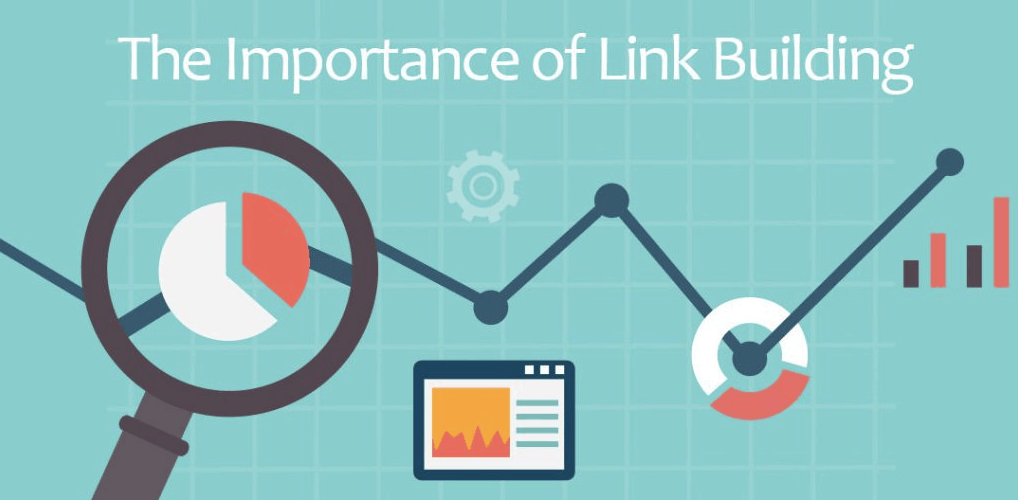
When it comes to ranking website pages on the search result, building quality links is one of the ranking factors considered by Google followed by engaging content and Rankbrain. To get a clearer perspective, here are some link building statistics:
- It is estimated that the 1st ranking page on Google has an average of 3.8x more backlinks than pages on positions 2-10. (Userp.io)
- Only 2.2% of content generates links from multiple websites. (Backlinko)
- 13% of SEO experts state that link building provides the most value out of all digital marketing tactics. (Conductor)
- 42% of SEOs spend equal time on building internal and external links. (Databox)
- 92% of marketers believe that in the next five years Links will still be a ranking factor for Google. (SocialMediaToday)
This just goes on to show how important link building in SEO is. Apart from these, links are important because:
- They help Google discover your website by pointing towards a well-written and informative piece of content that deserves to be ranked #1.
- Links help pass link juice/link equity (value and authority) from one page or site to another. This is seen as 'votes' by search engines given by other websites, which helps them determine that a page is valuable to the reader and worth promoting.
- Links also help build trust as quality backlinks on a website makes it seem more legit. In Google's words, 'it is unnatural to find a website without backlinks'.
3. Different Types of Backlinks: Beneficial Links For SEO
-
- Links to Valuable Content (Editorial Backlinks)
By far the best SEO link strategy that drives numerous benefits, editorial backlinks are created when your content is cited as a source for information on a particular topic. Mostly, a website will add your article/infographic link in their content, which gains you a backlink naturally.
Editorial backlinks can be gained through link round-ups, interview, or when it is used as a citation/reference for additional information. This type of backlink, however, is much harder to obtain and can only be gained by creating evergreen content.
-
- Guest Blogging Links

In SEO, guest blogging outreach plays a key role in acquiring valuable backlinks. Here, you pitch to an influential website in your niche offering to write a guest post for them and add an editorial backlink (of your site) within the content. This is one of the easiest link-building strategies that help build trust and authority for your site.
Using this technique, we were able to acquire ample of high-quality backlinks for our infographic post on WordPress website maintenance.
-
- Links in Guest Post Bio
While most websites allow you to add a link back to your site within the content when submitting the guest post, some site's don't. Instead, they offer a link in the author bio. This may not be as valuable as a link in the main body of the content, but it still adds to your link portfolio which is better than nothing.
-
- Links in Social Media Accounts
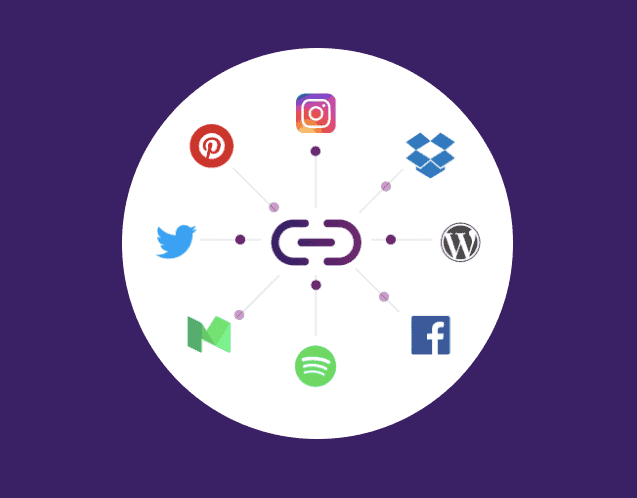
Getting a natural link from social media platforms is very simple and easy. Most social media networks such as Facebook, Twitter, and Reddit allow businesses to add a link to their external website or blog in their profile. You can even add links in posts. However, social media backlinks do not have much effect on your search rankings, but they do help increase your business reach and improve brand trust.
-
- Links in Business Profiles
This is another link-building strategy that is pretty straightforward. You can create an online profile for your brand on well-known web directories or review sites such as Foursquare, Yellow Pages, Yelp, etc and link back to your website. These links on industry-specific directories, business listing sites, and social media platforms inform search engines that you are a well-established website. Just ensure that your NAP details (name, address and phone number) are consistent across all business profiles to maintain authenticity.
-
- Links in Press Releases

This is one of the other link-building methods that help you gain backlinks. If your brand has something interesting or newsworthy announcement to share, write a press release and submit it on different submission sites that will distribute it to other media outlets. Press Releases provide two-fold benefits; one - you get a link and two - it serves as a marketing tactic.
4. Link Building Techniques (Natural Links)
When talking about link building techniques, natural link building refers to links that are obtained organically i.e. without pitching for a guest post or through sponsored/paid content. Getting good-quality, high-authority links can be difficult but not impossible if you have an actionable link building strategy. Thus, mentioned below are a few types of link building techniques that are used to gain backlinks naturally.
i. Skyscraper Technique
The skyscraper link building technique, made famous by Brian Dean from Backlinko, is the simplest way to earn quality editorial links for your website organically. It is a 3-step process:
- Researching and finding popular content (topics) with a good amount of backlinks.
- Creating better, in-depth content on the same topic (you can create an infographic, add statistics).
- Publishing the content on your website and promoting it diligently, so that it is easily found by the right people.
Click here to learn more about the Skyscraper technique.
ii. Broken Link Building
This is an advanced link building technique that also involves 3-steps.
- Find dead pages on the top sites in your niche, which has backlinks. You can use the Ahrefs Broken Link Checker to discover them.
- Create similar but better content than the broken resource.
- Send an email to the websites with broken links, and ask them to replace the dead resource with your working resource.
Most website owners are happy to replace a broken (404) link with a working resource as it helps them avoid penalties and improves their user experience.
iii. Content-based Link Building
Creating quality content is the quickest way to build a good amount of backlinks for your website. Here, the goal is to create a linkable asset that provides value to users. It could be an infographic or a how-to guide or an ebook like the one we created for Reseller hosting.
Your content needs to be relevant, informative and interesting to make an impact. After publishing the content, you need to promote it extensively and if your content is really helpful, it will fetch you enough backlinks without having to pitch for it.
iv. Resource Link Building
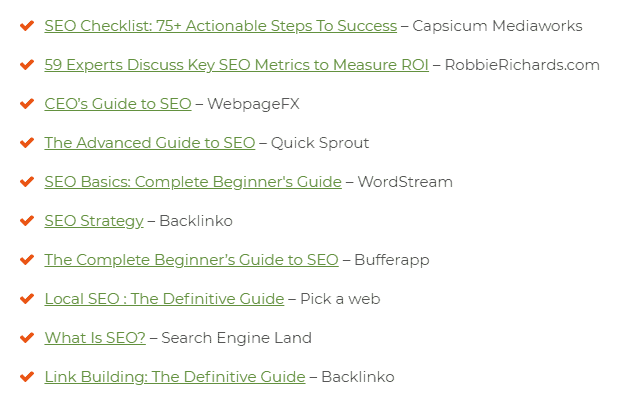
Another easy link-building strategy, resource link building refers to getting your page/post listed as a resource for a particular topic on a website.
For example, a website writing about SEO may have a resource section that lists down important SEO resources.
Most websites curate and link out to useful industry/local resources. As such, you can reach out to these websites and let them know about your blog/article and ask them to add it as a resource on their web page, which will get you a backlink.
v. Guestographics
One of the best link building strategies, Guestographics includes two parts - creating an infographic and pitching the same to relevant websites in your niche with the option of writing a mini guest post for free. This will most definitely get you a contextual backlink, which is more valuable than any other types of backlinks.
vi. Link Reclamation
Link building in SEO requires a lot of time and effort. However, over time, you may lose some of the backlinks that you have earned if a website removes your page or if the page is deleted by mistake or they have updated their content or redesigned their site. No matter the reason, when you lose a backlink, you also lose the link value. Thus, here, with the link reclamation technique, you can recover these lost links by finding, fixing, and replacing them. Read here to learn more about link reclamation.
vii. EDU Link Outreach
Building .EDU links for your website can be extremely beneficial as they have very high-authority. Acquiring a backlink from an .EDU domain can help boost your search ranking. This, however, doesn't mean that backlinks from other websites are not valuable, it's just that .EDU domains attract more trust and authority than others.
Getting an .EDU backlink is hard, but you can get them through broken link building opportunities on their resource pages or by creating a scholarship page.
Check out this blog to learn more.
5. Link Building Techniques (Unnatural Links)
-
- Paid Links (Sponsored Guest Posts)

While a guest post is free content that you write for a website in order to get a link back to your site; a sponsored guest is one for which you need to write the content as well as pay a 'fee' to get your content published on the website for a backlink. Too many paid links are bad for your SEO campaign and considered an unnatural way of building links for your website. So, be careful and highly selective where paid links are concerned.
-
- Links from Low-quality Directories or Forums
While links coming from well-established directories and forums are not bad, if you have a huge number of links from low-quality directories and foreign discussion forums, it will look spammy and can get your site penalised by Google. Thus, to avoid a penalty, it is best to disavow these spammy links.
-
- Links from Irrelevant Sites
As the name suggests, they are irrelevant to your site and as such, won't provide any value. It is best to stay away from these sites and instead focus on building quality and relevant links from around your niche industry which will help improve brand awareness as well as increase ranking.
-
- Links from Negative SEO Attacks
Negative SEO refers to any practise that is employed with the aim of sabotaging the rankings of a competitor's website. This includes creating duplicate content, toxic backlinks, comment spam links, exact match/spammy anchor text, fake negative reviews etc. It is important to identify these negative SEO techniques and rectify them before they harm your website and search performance.
-
- PBNs (Private Blog Networks)
This is another unethical link building strategy that you should steer clear of. Private blog networks refer to a network of websites that are created with the sole purpose of linking to a central website in order to improve its authority in search. They are often built using expired domains that had some level of authority and links and are considered a cost-effective way of building links for a primary website. However, PBNs violate Google's Webmaster Quality Guidelines and can result in your site being penalised.
-
- Hidden Backlinks
A hidden backlink refers to a link that is made invisible to the user and search engines either by changing the background colour or manipulating the text. This is considered a black hat SEO strategy that could cause trouble for your site, if detected by Google. Thus, it's best to avoid this and stay in line with Google's best SEO practices.
-
- Footer and Sidebar Backlinks
Footer or sidebar links don't have much effect or link juice and can often get devalued. So, don't waste your time and effort in obtaining them, rather focus on other link building tactics that will provide much value to your website.
-
- Link Exchange
Also referred to as reciprocal linking or swapping backlinks, link exchange is when two sites agree to link to each other to boost authority and attract organic traffic. This is done solely to promote a website and as such is considered an unnatural link building technique that is frowned upon by Google and considered a violation of Webmaster Guidelines.
-
- Blog Comments
Blog comments were considered the simplest way to build links for your website. However, most people started abusing this technique and soon blog posts were overrun with spammy comments instead of thoughtful comments that offered value. Most links in blog comments today have a no-follow tag - which tells search engines not to provide any value (link juice) to the outgoing link.
-
- Low-Authority Backlinks
Low-authority backlinks are considered toxic links that may harm your site's ranking and could lead to penalties by Google. If your site gets penalised, it will impact your page rank. Thus, it's best to have a few high-authority backlinks than hundreds of low-authority links.
6. Local SEO Link Building
-
- Find Local Business Directories
When it comes to local SEO link building, this one of the easiest methods through which you can acquire quick links for your website. All you have to do is claim your business on sites that list local businesses and optimise your listing by filling in detail all the relevant fields.
Make sure your NAP (name, phone number and address) is consistent across all local business directories. This will help improve your brand's credibility and make it easier for local users to find you online. You can start claiming your listing on Google My Business, Bing Places for Business, Yelp, Yellow Pages, among others.
For additional link-building opportunities, you can also search directories with the following key phrases 'your city business listings' and 'your city directories.'
-
- Sponsor a Local Scholarship
Scholarship link building can be challenging, but it's a great way to add value to your community and in return, earn valuable links for your website. Schools, colleges, and university websites have high domain authority and getting a link from these websites can help boost your SEO. To get listed for scholarship programs on educational websites, ensure that you create a scholarship that is related to your business. For instance, if you are a digital marketing agency, then offering digital marketing scholarships to students would likely get you listed on reputable educational websites without much hassle.
-
- Find Industry-Specific Directories
As mentioned above, business directories list different businesses within a particular location, niche or category. You can choose and submit your business listing to any of the industry-specific or location-specific directories available online. When listing your company on these sites, make sure to have consistent NAP data, add a link to your website, add company description and images.
-
- Opportunities on Local Websites
The more relevant a link is to your website, the higher the value it provides to your overall backlink profile. You can look for link-building opportunities on local blogs, websites or online newspapers. Search with 'location + keyword' and pitch a guest post to these sites. If it's a local newspaper, pitch an interesting story that they would like to publish. Local round-up posts are another way to get your business included. Or ask the site owners to add your website's link if they have mentioned your website as a resource or reference.
-
- Create a Job Listing Board
This is an unconventional method used for link building that is work-intensive. By creating a job listing board on your website, you can earn quality contextual links. As companies start posting job openings on your website, your site will start gaining popularity. Once you have substantial job openings on your website, you can reach out to colleges and universities and request them to add your job board to their career resources page. This will get you more links and improve your backlink profile. ProBlogger job board is an excellent example of how to use this link building technique effectively.
-
- Monitor Competitors' Backlinks for Relevant Opportunities
One of the best ways to get relevant links is to monitor your competitors' sites for backlinks. Research and understand their backlink profile, check what websites are linking out to your competition and pitch your article to them. There is a good chance they will link back to your website too. To monitor your competitors' backlinks, you can use the link-building tools mentioned below.
7. Link Building Tools and Tips
For an effective SEO link-building campaign, you need to pick an efficient link-building tool that will help you to carry out the entire process seamlessly. Finding link-building opportunities can be a tedious task if done manually. Thus, here using link-building tools can help you to save significant time.
The below-mentioned tools will help you to find link‐building opportunities (link prospecting), help you to vet prospects (so you can prioritize them), and get their contact details (for outreach).
-
- Ahrefs: This is one the most popular link building tools that not only help in finding link‐building opportunities by analyzing your competitors (through Site Explorer) but also helps vet prospects via the Batch Analysis feature. Ahrefs also helps you to find broken link building opportunities, and its 'Link intersect' feature lets you see which sites link to your competitors.

-
- SemRush: With over 2,000 prospects for each domain, predefined outreach modules, and 4 parameters for tracking outreach, SemRush is another powerful tool that can help you explore new backlink sources. It provides detailed information about websites, including contact information, website links, social details, etc. Use the pre-defined outreach module to send personalised emails and once you have earned a backlink, you can also monitor & track it to ensure all acquired links are active.
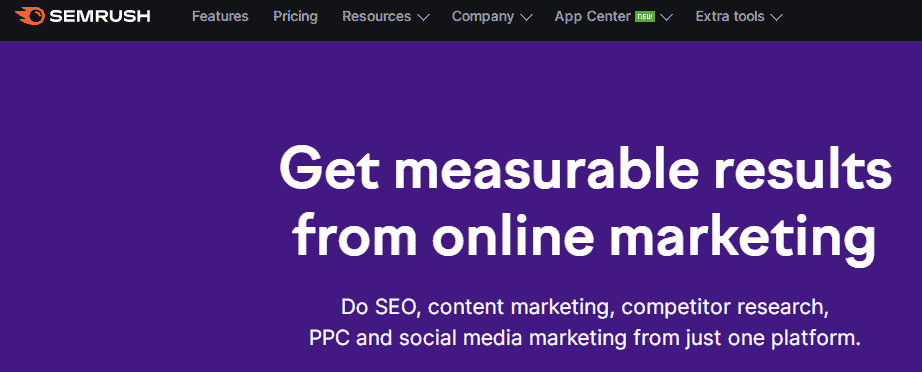
-
- BuzzSumo: While not a link building tool per se, the Buzzsumo tool can help you to come up with engaging (linkable) content topics through its Content Analyzer feature. It also helps you to find influencers in your niche. Plus, it lets you know when someone tags your brand through its 'Brand Mentions' feature which can help you to turn unlinked brand mentions into backlinks.
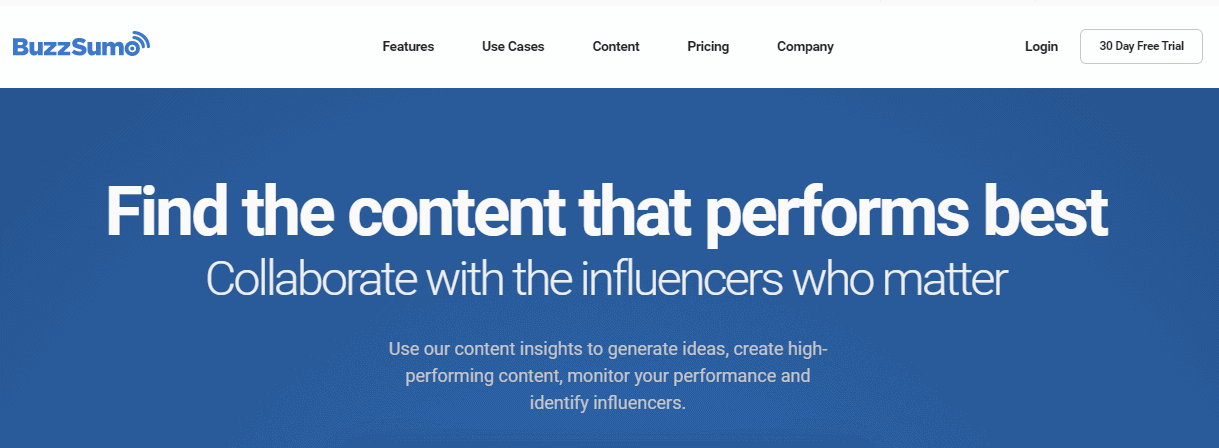
-
- Pitchbox: This is an end-to-end link building productivity platform that allows you to find bloggers, publishers, and influencers in your niche at a click-of-a-button. It helps you to create personalised outreach emails and offers an automatic follow-up option that can help to significantly boost your response rate.
Pitchbox also offers pre-built campaigns, including blogger outreach, competitors backlinks, broken backlinks, product reviews, metric filters, among others. Plus, it provides insights into your outreach campaign's performance and progression.
- Pitchbox: This is an end-to-end link building productivity platform that allows you to find bloggers, publishers, and influencers in your niche at a click-of-a-button. It helps you to create personalised outreach emails and offers an automatic follow-up option that can help to significantly boost your response rate.

-
- Mailshake: Sending outreach email to multiple prospects manually can be an overwhelming task. As such, with Mailshake, you can automate your outreach campaign as it enables you to send personalised emails and engage with prospects through email, social, and phone - all from a single platform. It also lets you monitor email open rates, clicks and replies. In addition, it offers seamless integration with third-party apps such as Gsuite, Outlook, Salesforce CRM, and others.
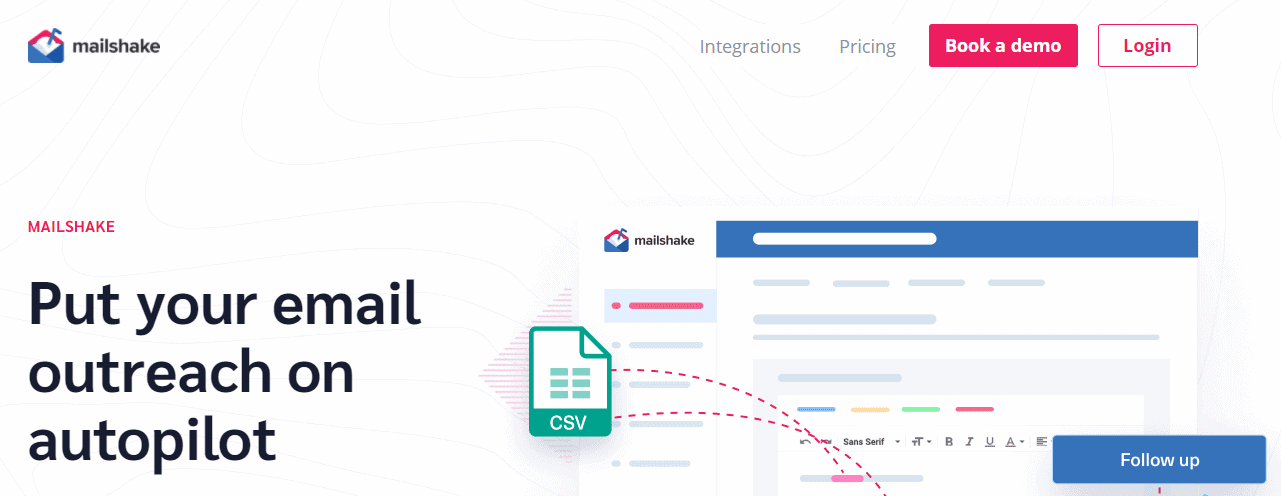
-
- NinjaOutreach: An all-in-one link building software, NinjaOutreach helps you to find business profiles, social media influencers, and email addresses in any niche, thanks to its massive database. It allows you to automate mass email outreach with up to 2 follow-up messages. It also lets you customise your outreach campaign with the option of an autofill contact form. With this tool, you can track email open rates, clicks, replies, and lead interaction. Plus, it alerts you when a lead replies through in-app and email notifications.
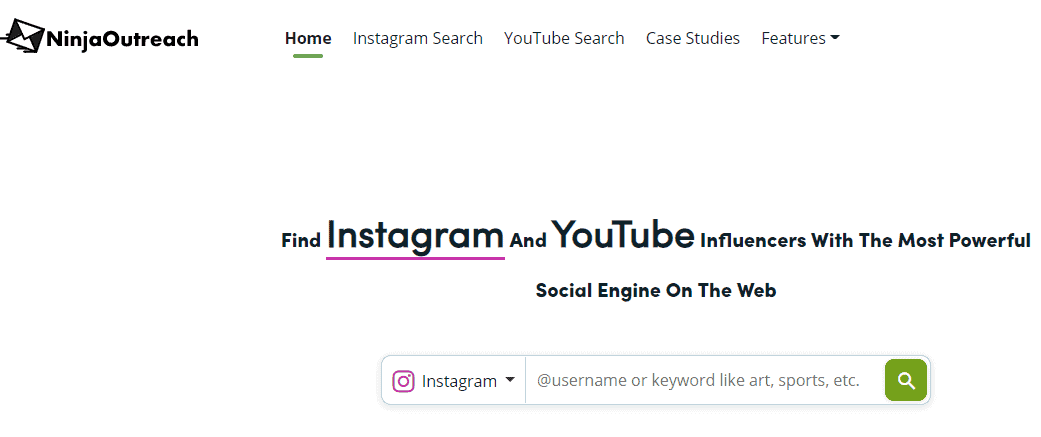
-
- Hunter.io: One of the easiest ways to connect with influencers in your niche, the Hunter tool helps you to find and verify professional email addresses. With this tool, you can find email addresses of companies, professionals and article authors. It integrates with Gmail, so you can compose campaigns and schedule follow-ups right from your Gmail account. The Hunter tool also allows email tracking and you can link multiple Google accounts to a single Hunter account for free. Try it today!
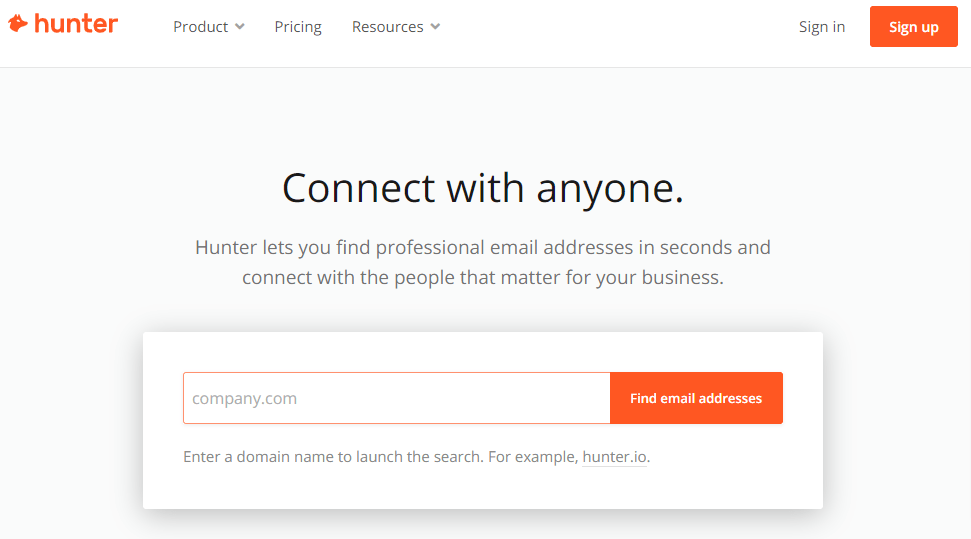
-
- Lemlist: As an email outreach tool, Lemlist helps SEO marketers to find link building opportunities. It can help you personalise cold emails, automate follow-ups, and engage with potential leads across varied channels easily. It can help improve your email open rate and also help you with broken link building via pre-defined templates. This tool can also be used to claim unlinked brand mentions. In short, it's an all-in-one outbound solution that helps solve every outreach automation challenge.
Bonus: Useful Link Building Chrome Extensions
- MozBar: This is the most popular chrome extension that gives you an overview of the link metrics for pages and domains as you search. It displays page authority, domain authority, and the number of backlinks. MozBar chrome extension allows you to create custom searches by engine, country, city, or region. You can also view the meta tags, general attributes, HTTP status, and more. If you like this tool, you can opt for the Moz Pro Subscription that offers premium features.
- SEOquake: Run a complete SEO audit for a web page with this free SEO chrome extension that offers key SEO metrics instantly. You can use the default parameters or create a custom set to view major metrics. It allows you to get a complete report for internal/external links, which you can export in a CSV format.
SEOquake toolbar also allows you to check social statistics for Facebook and Google+. What's more, it offers a keyword density report and is compatible with several browser extensions. - Mangools SEO Extension: This chrome extension is compatible with both Chrome and Firefox. It allows you to check for metrics such as domain authority, page authority, citation flow, Alexa ranking, followers on social profiles, and more. It helps with on-page SEO analysis and provides a list of your competitor's backlinks directly in your browser. It also helps you find broken links on a website and offers many other advanced features.
- Nofollow: This is a simple chrome toolbar that outlines nofollow links (including UGC or sponsored) of all web pages. It also detects dofollow links of a web page, external links, and links on pages that have nofollow robots meta tags.
- Scraper: This is a data mining chrome extension that allows you to collate different web page data into a spreadsheet. The Scraper tool is an easy to use tool ideal for both novice and advanced users.
- Linkclump: This toolbar allows you to open multiple links in the browser in one go. It also allows you to bookmark multiple links and offers various features.
- Check My Links: This is an excellent tool that allows you to find broken links on a web page. Check My Links extension is well-suited for web designers, developers and content editors as it highlights all the bad/broken links on a page, which you can copy to your clipboard with one click.
#Final Words
When it comes to optimising a website to improve its ranking, link building plays a vital role. High-authority backlinks pointing towards your website helps improve your site's credibility and trustworthiness. The process of earning good quality backlinks may be hard, but persistence always pays off, so you need to put in time and effort and try out different tactics to create a link building strategy that works for you.
Also, remember that quality is way more important while building backlinks than quantity. Thus, make the most of this link building infographic guide and follow these best link building practices to create a strong backlink profile for your website. Want to create a new website? Purchase the best website hosting with these free BigRock Coupon.




Leave a Reply